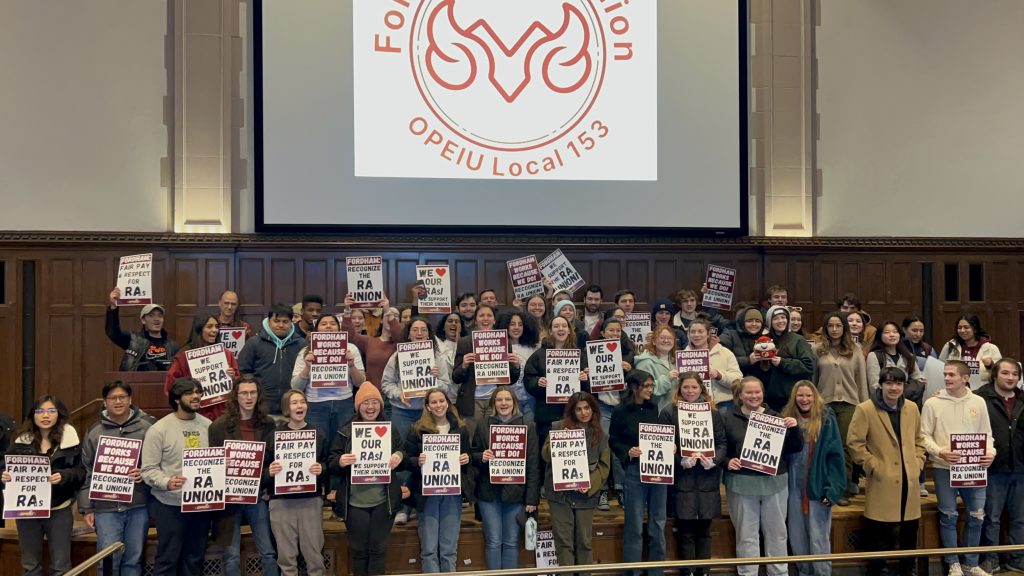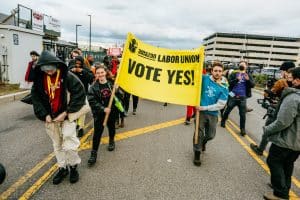Last Wednesday, resident assistants (RAs) at the Rose Hill campus of Fordham University announced the formation of their union with OPEIU Local 153. The announcement came just two days after Fordham Faculty United (SEIU Local 200 United), the contingent faculty union on campus, ratified their second contract. The establishment of the Fordham RA union is the latest instance of a new but rapidly growing trend in undergraduate worker organizing on college campuses. OPEIU Local 153 also represents RAs at Barnard College and most office workers at Fordham.
Over three-quarters of the bargaining unit signed a union recognition petition that was delivered to Fordham president Tania Tetlow on February 1. The union gave Tetlow until end-of-day February 7 to voluntarily recognize the union, and now it is filing for an NLRB election.
In 2016, undergraduate dining hall workers at Grinnell College won the right to collectively bargain under an NLRB ruling that now applies to undergraduate workers at all private colleges. In the years since then, many more undergraduate worker unions have sprung up, including at Kenyon College, Dartmouth University, Hamilton College, Barnard College, Wesleyan University, Brown University, and Temple University. In early 2022, workers at Grinnell expanded their union to include all undergraduate workers on campus. In June of last year, union busters at the law firm Jackson-Lewis warned bosses in a private webinar that a surge in student worker organizing was on the horizon — and that prediction is coming true.
The Fordham RA union drive began early last fall, just as Fordham Faculty United was escalating its contract fight into a strike campaign and the Fordham Graduate Student Workers (CWA Local 1104) were in the middle of bargaining. Over 76 percent of the 96-person bargaining unit signed the petition delivered to President Tetlow. The union’s three primary demands are “CCP”: communication, compensation, and protection.
Left Voice spoke to Peter Wolff, a Senior RA at Fordham who has worked in that position for three years. Wolff explained that while all RAs are undercompensated, RAs at Fordham aren’t actually paid in wages at all — they receive an “RA award” that covers room and board, but the monetary value of the RA award is subtracted from the value of workers’ need-based financial aid packages. This means that some RAs with more financial aid end up with net zero compensation for their work — an arrangement that by its very nature targets student workers with the most financial need. In this way, Fordham recoups all or most of the costs of employing RAs, depending on each worker’s financial aid package.
On communication, Wolff said:
A lot of times, [the Office of] Residential Life does a poor job communicating what is needed for our role. […] This goes from very basic things like when we need to be on campus, what dates we need to move in for training, and when we can leave during breaks. Sometimes those dates they give us are incorrect. And it’s really challenging for RAs who live out of state and need to plan their travel. […]
But the communication issues also extend to much more stressful and high intensity situations involving discrimination, sexual assault, or just a documentation involving a student or when a student needs emergency medical services. We had an incident last semester where we had a situation of discrimination, and the RAs reported it and did a very good job, but we received no follow-up information from anyone, anyone else in Residential Life. And we have students coming to us. We’re deeply affected by the situation, and we’re trying to do something on the ground with our relationships with students to ensure, like, “Hey, we’re here for you, we care for you.” But we can’t do that, because Residential Life isn’t communicating with us about the state of this investigation that’s going on in public safety and in Residential Life. So that’s the big communication part. It really emphasizes the fact that they don’t believe we can handle this information. And it stems from the fact that they kind of see us as children and don’t respect us fully. The lack of communication in those situations can also lead us to be in situations that are high stress and can be a little dangerous at times.
For example, 2020 was a challenging year for everyone, especially in Residential Life. All the new policies and procedures that were put in place in the university to ensure that students were safe were overseen by Residential Life: dealing with testing, quarantine, food delivery, making sure people were staying safe in the dorms and social distancing, and wearing masks. So it was a lot for everyone. But that really exacerbated the lack of communication about what was going on. I was put in situations then where residents are calling me, they’re like, “We need to be quarantined. We don’t know where to go.” So I had to deal with them and interact with them, but they’ve been exposed to Covid. Residential Life might not have all of these answers, but saying something about, “hey, we’re working on this, and we’re doing something,” is better than saying nothing. There’s a very big difference between no communication and saying “We don’t know. We’re trying our best.” So the whole year of Covid was very challenging, especially for us, because we were on the ground dealing with this very challenging and hazardous work environment.
Wolff suspects that Residential Life had caught wind of the union campaign before the official announcement, citing what he calls “the censorship talk.” At the beginning of this semester, officials gave RAs a “very strict talk” about speaking publicly about their working conditions or anything else relating to the Office of Residential Life. But workers have a right to protected concerted activity, and this includes speaking about the facts of their working conditions.
On February 3, the Fordham RAs livestreamed a rally to kick off their public union drive. Several current and former Fordham RAs spoke, as well as unionized RAs from Barnard College and Wesleyan University and fellow unionized Fordham workers from Fordham Faculty United and Fordham Graduate Student Workers. When asked how he sees the Fordham RA struggle fitting into the broader labor movement, Wolff said,
Because we all are students and a younger generation, I see this kind of being what we grew up with. I think my parents and my upbringing very much instilled in me, “Hey, you have an avenue to fight.” I’ve been very fortunate to understand that I have methods and means to fight for what I believe is injustice and fight for better systems of protection and for my working environment. I think it’s part of this younger generation’s upbringing, understanding that we do have this avenue to fight for what we believe is right.
He also explained that in the days since the union went public, the RAs have received a lot of support, as fellow students reach out to learn more about their working conditions and what the job entails beyond the more visible work of putting on programs and doing rounds. Being required to live at work as part of the job is also an aspect of RAs’ working conditions that creates its own stress and strain. Even when RAs are not officially on duty, they are still on call whenever they are in the residence hall.
Wolff says that right now, the best way for Fordham students and workers to support the union is to talk to the RAs they know and learn more about their working conditions, and to show up for future events like last Friday’s rally. Community members can also follow the union on Instagram and share messages of solidarity there.
Wolff ended our conversation with this: “They underestimated the students so much that they don’t think we have the capacity to do this, or they don’t think it’s that much of a threat. And their naivete about us worked to our advantage.”











